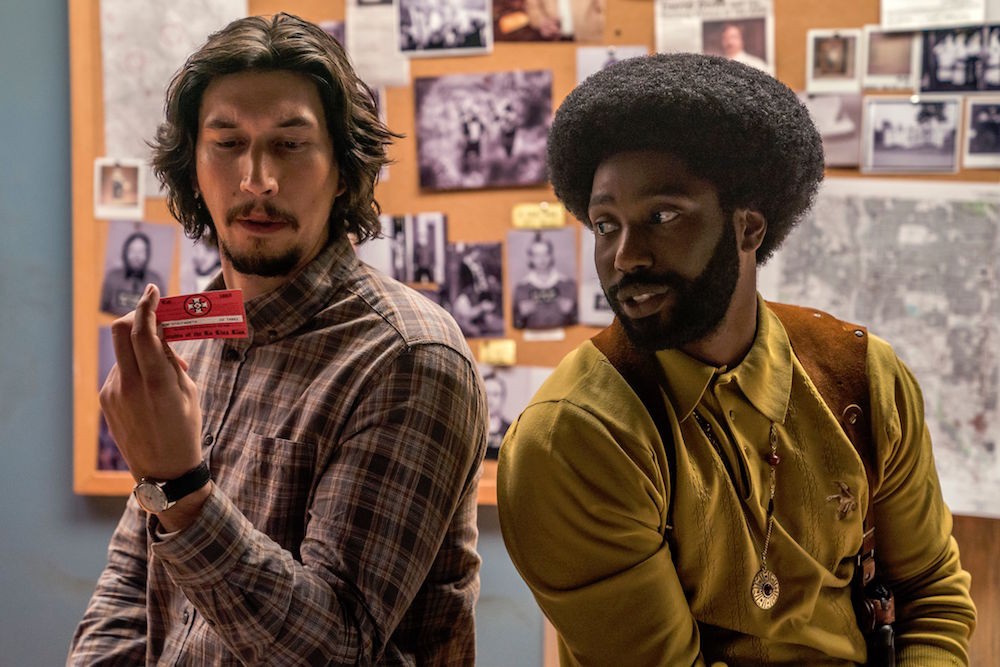BlacKkKlansman
BlacKkKlansman, 2018, 1 ¾ stars
Incendiary
Lee’s BlacKkKlansman is provocative but flawed
From The Orlando Weekly, August 8, 2018
Spike Lee practically wrote the book on cinematic sizzle and provocation, or at least the chapters that address the issue of race in modern America. And though the latest addition to his canon, BlacKkKlansman, is undeniably powerful, it’s also one big mess of a movie: structurally flawed, conceptually challenged and tonally troubled.
Based on the subject’s autobiography, BlacKkKlansman is the unique story of Ron Stallworth, a black policeman from Colorado Springs, Colorado, who infiltrated the Ku Klux Klan in the 1970s. Well, sort of. Not being able to go fully undercover because of his color, of course, he partnered with a white officer, who did the physical infiltration.
Amazingly, Stallworth handled all the phone conversations while his partner met the Klan members – including Grand Wizard David Duke – in person. And the KKK clowns could never tell the difference in voices. (That detail is actually true, although its inclusion in the film stretches believability. But I guess Lee correctly assumed we wouldn’t credit the KKK imbeciles with much intelligence.)
In real life, the undercover operation led to the discovery that federal employees were KKK members. That revelation is included in the movie along with other details of the investigation and Stallworth’s life, included a sandwiched romance and an explosive ending. Some details are true, some are embellished, and some are invented, for above all else, this is a Spike Lee joint. It’s an example of Lee – along with co-writers Charlie Wachtel, David Rabinowitz and Kevin Willmott – using an event to teach us a lesson about race, both then and now.
Lee has earned the right to help lead that national discussion on race. I haven’t. But I respectfully disagree with his filmmaking choices as they relate to that discussion. For instance, instead of creating a drama that thoughtfully juxtaposes the 1970s with 2018, or diffuses the horrors of bigotry and racism with comedy (think Mel Brooks’ “Springtime for Hitler”), Lee combines the two genres. The result is a tonally challenged mishmash of subplots, messages and moods.
Though the film offers sporadic laughs, I found it impossible to muster even a grin amid the onslaught of nauseating racial, ethnic, homophobic and misogynist slurs that the actors utter, many of which are played for comedy. The two leads (John David Washington as Stallworth and Adam Driver as his partner) are effective, as is Topher Grace as Duke, but most of the supporting cast badly overacts. The film does offer moments of dramatic power, but they are too often sullied by misplaced stylistic flourishes, over-scoring and awkward split screens. So by the time the 135-minute film finally ends – with chilling, real footage from the 2017 Charlottesville tragedy – I was exhausted by the film’s intensity and addled by its unfocused narrative.
A myriad of cultural icons and political figures are ripe for attack. Birth of a Nation gets it the worst, as it should, but Donald Trump doesn’t fare much better. Richard Nixon and even Woodrow Wilson are skewered, as is Gone with the Wind, though, strangely, the film’s soundtrack is changed, presumably because Lee didn’t have the rights. This in-your-face attitude should not surprise anyone, as Lee is an artistic flamethrower, which is often a noble endeavor. But this time his fire scorches almost everything in sight equally.
Art is meant to anger, to provoke, to wake people up to injustice. And BlacKkKlansman does that unrelentingly. But judged as a serious piece of filmmaking – as it should be, considering Lee’s past work – his latest film is an unorganized, misguided provocation with a cinematic sledgehammer.
© 2018 Orlando Weekly / MeierMovies, LLC
